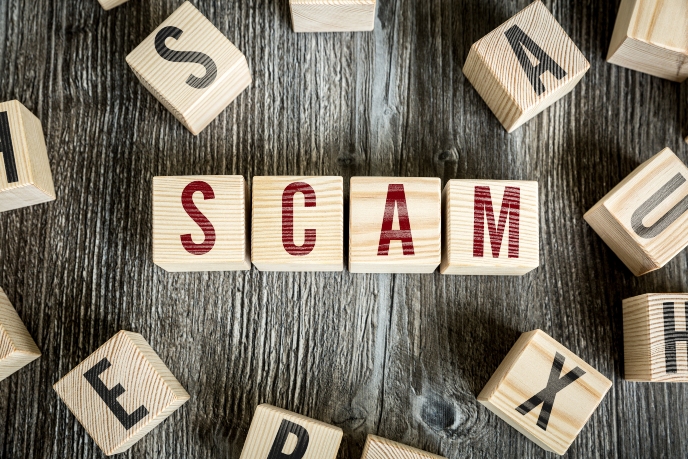Scammers claiming to be from HMRC are continuing to exploit the COVID-19 crisis. Sole traders and small businesses are particularly at risk from the latest scams that trick people into believing they are due a tax refund or a special payment in relation to the pandemic.
So what are the fraudsters’ latest tactics? Here we outline the scams to watch out for and explain how to guard against falling victim.
Email scams relating to SEISS
Fake emails come in various formats but one of the most prevalent is an email claiming the recipient is eligible to claim for the Self-Employment Income Support Scheme (SEISS). The SEISS is a genuine grant scheme set up by the government to offer support during the pandemic. However, HMRC will not email and ask you to click on a link in order to claim.

The fake email asks you to sign in to HMRC by clicking on a hyperlink. If you click on this link, you could be taken to a bogus website where scammers will try to obtain personal information such as passwords, dates of birth and bank login details. Ultimately this data could be used to steal money from your account or spread malware through your computer system.
SMS text message claiming to be from HMRC
When you see ‘HMRC’ displayed as the sender of a text, it’s easy to think the message must be genuine. But scammers are increasingly sophisticated and use a process called number spoofing to pose as a trusted organisation such as your bank or HMRC.
Again, these texts will falsely offer payments, rebates or refunds to businesses or workers who have been affected by COVID-19. Do not click on any links included in the text, or ring any numbers listed.
Phone calls and voicemails threatening legal action from HMRC
If you’ve received one of these phone calls, you’ll know just how unsettling they can be. An automated voice announces that you owe tax and that a warrant has been issued for your arrest.
For any self-employed worker or business owner who might be behind with tax payments due to the pandemic, these types of calls can be panic-inducing to say the least. Even if you’re confident that your tax affairs are up to date, it’s a shock to be on the receiving end of this particular scam.
Anyone unlucky enough to get this call should stay calm and not engage in any way (for example by pressing 1 to speak to an HMRC officer). Simply end the call. To double check your true tax status, contact your accountant or bookkeeper, or get in touch with HMRC directly.
Fake HMRC messages on social media
Even social media and messaging platforms such as Twitter, Facebook and WhatsApp have been targeted by criminal phishing gangs. Be extremely wary of any messages claiming to be from HMRC sent via these apps. They are not genuine and HMRC says it will never use WhatsApp or social media to offer a tax rebate, or to request personal or financial information.
Tell-tale signs that scammers are at work
Spelling mistakes, poor punctuation and dodgy grammar often indicate a bogus message. Some scammers are credible writers, however, so don’t assume a message is legitimate just because it reads well.
Action Fraud, the national fraud and cybercrime reporting centre, also warns to look out for the following characteristics:
- The sender’s email address doesn’t tally with the trusted organisation’s website address
- The email is sent from a completely different address or a free web mail address
- The email does not use your proper name, but uses a non-specific greeting like “dear customer”
- A sense of urgency; for example the threat that unless you act immediately your account may be closed
- A prominent website link. These can be forged or seem very similar to the proper address, but even a single character’s difference means a different website
- A request for personal information such as user name, password or bank details
- You weren’t expecting to get an email from the company that appears to have sent it
- The entire text of the email is contained within an image rather than the usual text format
- The image contains an embedded hyperlink to a bogus site
Received a scam message? Report it right away
Once you’ve identified a message as fake, the temptation is to delete it and forget it ever existed. However, if you can take a few minutes to report a suspicious call, email or text, it will help the authorities to track down and prosecute the perpetrators.
Reporting fraudulent messages also allows HMRC and other organisations to warn customers of the latest tactics – helping us all to be vigilant and share details of current scams.
Forward details via email to phishing@hmrc.gov.uk. Action Fraud also has a dedicated reporting facility.
And finally – don’t ignore the genuine messages!
If you’ve opted for paperless communications from HMRC, you will be contacted from time to time via email. Don’t ignore these messages. To safely check your tax status, independently call your tax office or log into HMRC online services via gov.uk using your unique passwords and identification codes.
Working with a professional bookkeeper will also give you a dedicated level of protection, helping to manage your finances and ensure your records are kept in excellent order.
For further information or advice don’t hesitate to get in touch. Please give us a call on 01892 559480, or contact our friendly team via our online enquiry form.







